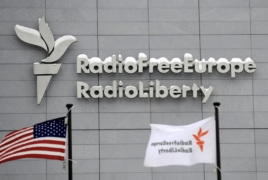
The foreign ministers of the European Union are discussing in Brussels possible ways to prevent the closure of Radio Free Europe/Radio Liberty. The Czech Republic, which has hosted the media outlet for three decades, has proposed replacing U.S. funding with European support, according to Radio Liberty.
The U.S. State Department has described the situation as "fluid", emphasizing that a final decision has not yet been made. At a briefing, State Department spokesperson Tammy Bruce did not clarify Secretary of State Marco Rubio’s stance on the issue.
"This is a fluid situation, and I look forward to its resolution. We must understand that this is a serious matter concerning taxpayer money. I must repeat—this remains a fluid situation, and we will have more information once a resolution is found," said the State Department spokesperson.
Polish Foreign Minister Radosław Sikorski stated in Brussels that the EU is still in the discussion phase.
"We will consider what can be done. One option is to increase funding for the European Endowment for Democracy. [Czech Foreign Minister] Lipavský even suggested buying these media outlets. We are currently in discussions, but there is no doubt that these are valuable institutions whose mission must continue," he said.
Sweden has also announced its support for the Czech initiative.
Swedish Minister for European Affairs Jessica Rosengren stated: "Today, we will express our support for the Czech initiative. Sweden is one of its co-authors. We must ensure that Radio Free Europe continues to be a voice for freedom and democracy, especially in countries where it is most needed."
Brussels has also expressed support for ensuring the continuation of these media outlets. Belgian Foreign Minister Maxim Prevot emphasized on his X account that the EU must find ways to "secure the long-term funding of media outlets."
As of now, 10 of the EU’s 27 member states—Czechia, Poland, Germany, Austria, Belgium, Slovenia, the Netherlands, Sweden, and the three Baltic states—have officially backed the idea of supporting Radio Free Europe/Radio Liberty.
International journalism organizations have also criticized the potential shutdown of the station.
The International Press Institute stated that "such a move would strengthen authoritarian regimes and deprive millions of access to reliable, alternative information."
Even some of Donald Trump’s supporters have criticized the decision to dissolve the US Agency for Global Media (USAGM).
Former Radio Free Europe/Radio Liberty President Ted Lipien wrote in an article for The Hill:
"There is no doubt that these agencies have suffered from mismanagement in recent years. But shutting them down is not the solution. On the contrary, it reduces the benefits the United States has gained from their work. Congress, both Republicans and Democrats, should pressure the White House to ensure these broadcasters resume operations as soon as possible. At the same time, efforts should continue to reform the bloated and inefficient bureaucracy in these agencies."
However, Kari Lake, who was appointed by the Trump administration as a senior advisor to the Global Media Agency, stated that they have no intention of backing down despite criticism.
Radio Free Europe/Radio Liberty has filed a lawsuit against Kari Lake and the Trump administration over the decision to cut its funding, The Hill reports.
Former President Donald Trump signed an executive order to dissolve the US Agency for Global Media (USAGM), which funds both Radio Free Europe/Radio Liberty and Voice of America (VOA).
According to a lawsuit filed in a Washington federal court, the station’s funding was immediately frozen, and an outstanding invoice of $7.4 million was left unpaid. The organization argues that this move violates Congress’s constitutional authority over federal spending.
The lawsuit also warns that without funding, the organization will soon be forced to lay off staff.
Radio Free Europe/Radio Liberty broadcasts in 27 languages across 23 countries, reaching an audience of more than 47 million people weekly.
Trump appointed Kari Lake, a former television anchor and later a gubernatorial and Senate candidate in Arizona, to oversee Voice of America as part of the USAGM dissolution plan. She is now serving as the agency’s senior advisor.

